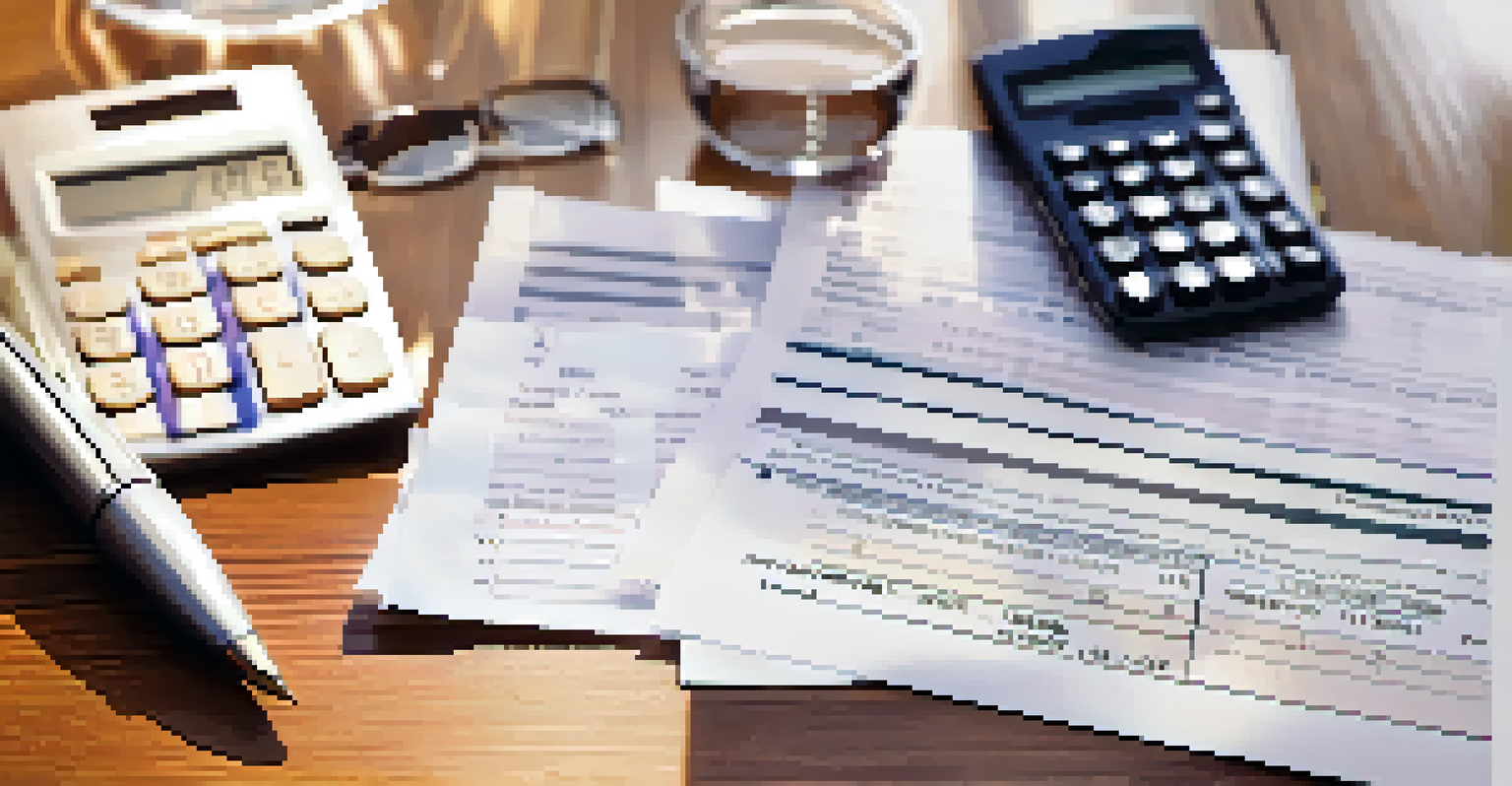What Are Prepaid Costs? Understanding Closing Costs

Defining Prepaid Costs in Real Estate Transactions
Prepaid costs refer to expenses that are paid in advance before closing on a property. These are typically recurring costs that a homeowner would normally pay over time, such as property taxes and homeowners insurance. By paying these expenses upfront, buyers can ensure that their financial obligations are taken care of right from the start.
The best time to plant a tree was 20 years ago. The second best time is now.
For example, if you're purchasing a home, you might need to prepay property taxes for the remainder of the year. This means you're essentially paying a portion of your future property tax bill at closing, which can help avoid any lapses in coverage or service. Understanding these costs is crucial as they can impact your overall budget when buying a home.
Prepaid costs can vary based on the location and the specifics of the mortgage agreement. It's always a good idea to review these costs with your lender or real estate agent to avoid surprises on closing day.
What Are Closing Costs and Why Do They Matter?
Closing costs are the fees and expenses that buyers and sellers incur during the completion of a real estate transaction. These costs are typically due at the closing meeting and can range from 2% to 5% of the purchase price of the home. Understanding these costs is important as they can significantly affect your overall financial commitment.

Examples of common closing costs include loan origination fees, appraisal fees, title insurance, and attorney fees. Each of these components serves a purpose in facilitating the transaction and ensuring that the transfer of ownership is legally sound. By breaking down these costs, buyers can better prepare for the financial obligations that come with purchasing a home.
Understanding Prepaid Costs
Prepaid costs are upfront expenses for recurring payments like property taxes and insurance, crucial for budgeting when buying a home.
It's essential to get a good faith estimate from your lender early in the process, which outlines these costs, helping you avoid any last-minute surprises. This proactive approach can make the closing process much smoother and less stressful.
Understanding the Difference Between Prepaid Costs and Closing Costs
While both prepaid costs and closing costs are associated with buying a home, they serve different purposes. Prepaid costs are essentially advance payments for expenses that will recur, whereas closing costs are one-time fees required to finalize the transaction. Understanding the distinction can help you plan your budget effectively.
An investment in knowledge pays the best interest.
For instance, if you’re budgeting for your home purchase, you’ll need to account for both types of costs. Prepaid costs might cover your homeowners insurance for the first year, while closing costs might include the fees for the home inspection and title search. This clear separation can help you manage your finances more efficiently.
Moreover, knowing the difference can assist you in negotiating with sellers. Sometimes, sellers may be willing to cover certain closing costs, but it’s less common for them to cover prepaid costs. This insight can empower you during negotiations and help you maximize your savings.
Common Types of Prepaid Costs You May Encounter
When buying a home, there are several common prepaid costs you might come across. These include property taxes, homeowners insurance, and even mortgage interest for the initial days of your loan. Each of these costs is often required to be paid upfront to ensure a smooth transition into homeownership.
For example, you might have to prepay homeowners insurance for the first year of coverage to protect your investment right away. This not only safeguards your new home but also fulfills lender requirements, as most lenders require proof of insurance before closing.
Closing Costs Can Be Negotiable
Buyers can often negotiate who pays for certain closing costs, potentially reducing their out-of-pocket expenses during the purchase.
It's wise to ask your lender for a detailed breakdown of these prepaid costs. Knowing what to expect can help you avoid any unexpected financial burdens as you approach closing day.
How to Estimate Your Closing Costs Accurately
Estimating your closing costs ahead of time can help you prepare financially for your home purchase. A good rule of thumb is to set aside about 2% to 5% of the home's purchase price to cover these costs. However, the exact amount can vary based on factors like your location, the loan type, and the specifics of your transaction.
One effective way to estimate closing costs is to request a loan estimate from your lender. This document will provide you with a detailed breakdown of the expected costs, including both prepaid and closing costs. Having this information early on allows you to adjust your budget accordingly.
Additionally, consider consulting with your real estate agent for insights on common closing costs in your area. Their experience can provide you with a clearer picture of what to expect, making the home-buying process less daunting.
Negotiating Closing Costs: What You Need to Know
Many buyers don't realize that closing costs are often negotiable. Depending on the market conditions and the seller's situation, you might be able to negotiate who pays for certain closing costs. This can be a significant way to reduce your out-of-pocket expenses when purchasing a home.
For example, if you're in a buyer's market where there are more homes for sale than buyers, sellers may be more willing to cover some of your closing costs to make their property more attractive. It's essential to approach these negotiations tactfully and be ready to justify your requests based on comparable sales and current market trends.
Prepare for Closing Day
Thorough preparation, including reviewing documents and ensuring funds are ready, can help ensure a smooth closing process.
It's also important to communicate with your lender about your negotiations. They can guide you on how these adjustments might affect your loan and help ensure that everything aligns with your financing requirements.
Preparing for Closing Day: Final Tips
As you approach closing day, preparation is key to ensuring a smooth process. Make sure to review all documents in advance, including the Closing Disclosure, which outlines your final closing costs and prepaid expenses. Familiarizing yourself with these documents can help you feel more confident on the day of closing.
Additionally, ensure that you have the necessary funds available, whether it’s a cashier’s check or wired funds, to cover your closing costs. Being financially prepared can reduce stress and prevent delays in the closing process.

Lastly, don’t hesitate to ask questions. Whether it's about the closing documents, prepaid costs, or the overall process, being informed is your best strategy. Remember, it’s not just a transaction; it’s a significant milestone towards homeownership.